Boiler Installation Headley
Find top Boiler Installation in Headley
Get multiple Boiler Installation quotes for your project today! Compare profiles, reviews, accreditations, portfolio, etc... and choose the best offer.

Neater Heat Ltd
5251 reviews6 Beechnut Ind Estate, Beechnut Road, Aldershot, GU12 4JA, GBNeater Heat Ltd is your local heating experts, committed to keeping you cozy and comfortable. Whether you're a homeowner or a landlord, we've got you covered with affordable care plans starting from just 48p a day! Our mission is to ensure that our affordable energy solutions evolve to meet the changing needs of our customers and the industry, while maintaining our reputation for the highest quality of service.
- Services
- Why Us?
- Accreditations
- Our Team
- Gallery
Get Quote
Gas-Fix
4.932 reviewsNorth Lane, Clanfield, Unit 2Blagden Farm, PO8 0QB, GBGas-Fix is a local business based in Waterlooville, Hampshire, serving the south coast of the UK. Founded by two former British Gas trained engineers with over 25 years of experience in gas central heating, gas appliances, and power flushing, Gas-Fix offers a comprehensive range of services. From fault finding and repairs to servicing and upgrading your central heating system, they aim to provide suitable options to match all budgets. They only fit boilers from reputable manufacturers with a proven reliability record. All engineers are Gas Safe registered and carry their official ID cards for your inspection. Gas-Fix is a proud member of Check-a-Trade and boasts a 9.9 out of 10 customer rating. As a Worcester Accredited Installer, they meet the high standards of installation, service, and customer care set by Worcester Bosch. They specialize in Worcester installations and offer exclusive benefits to homeowners.
- Services
- Why Us?
- Accreditations
- Gallery
Get Quote
Maximum Climate Control
Unit 1, Falcon Court, Parklands Business Park, Denmead, PO7 6BZ, GBExperienced, qualified engineers and designers of HVAC. Offering domestic and commercial installation and maintenance across the UK. We help clients predominantly across the south of England by designing and installing. Our experts at Maximum Climate Control offer domestic and commercial air conditioning system installation and maintenance on the South Coast and across the United Kingdom. Based in Hampshire, we also offer our HVAC services in East and West Sussex, Kent, Surrey, Dorset, Wiltshire, Central and Greater London climate control system. We offer a range of cost-effective air conditioning units including ducted air conditioning, wall mounted air conditioning and ceiling mounted air conditioning systems.
- Services
- Why Us?
- Accreditations
- Gallery
Get Quote
JML Plumbing & Heating
526 reviewsThe Business Centre, 1000 Chester Road, Unit 10, Birmingham, B37 6AA, GBJML Plumbing is a family-run business with over 20 years of experience in the plumbing industry. We pride ourselves on providing a reliable, efficient and friendly service to all our customers. We cover all aspects of plumbing, from small repairs to large installations. We are fully insured and Gas Safe registered, so you can be confident that you are in safe hands. Our team of experienced plumbers are dedicated to providing a high quality service at competitive prices. We are available 24 hours a day, 7 days a week for emergency call outs. We offer a wide range of plumbing services, including: Boiler installations and repairs Central heating systems Bathroom installations Kitchen installations Drainage services Leak detection and repair Water softener installations Contact us today for a free quote.
- Services
- Why Us?
Get Quote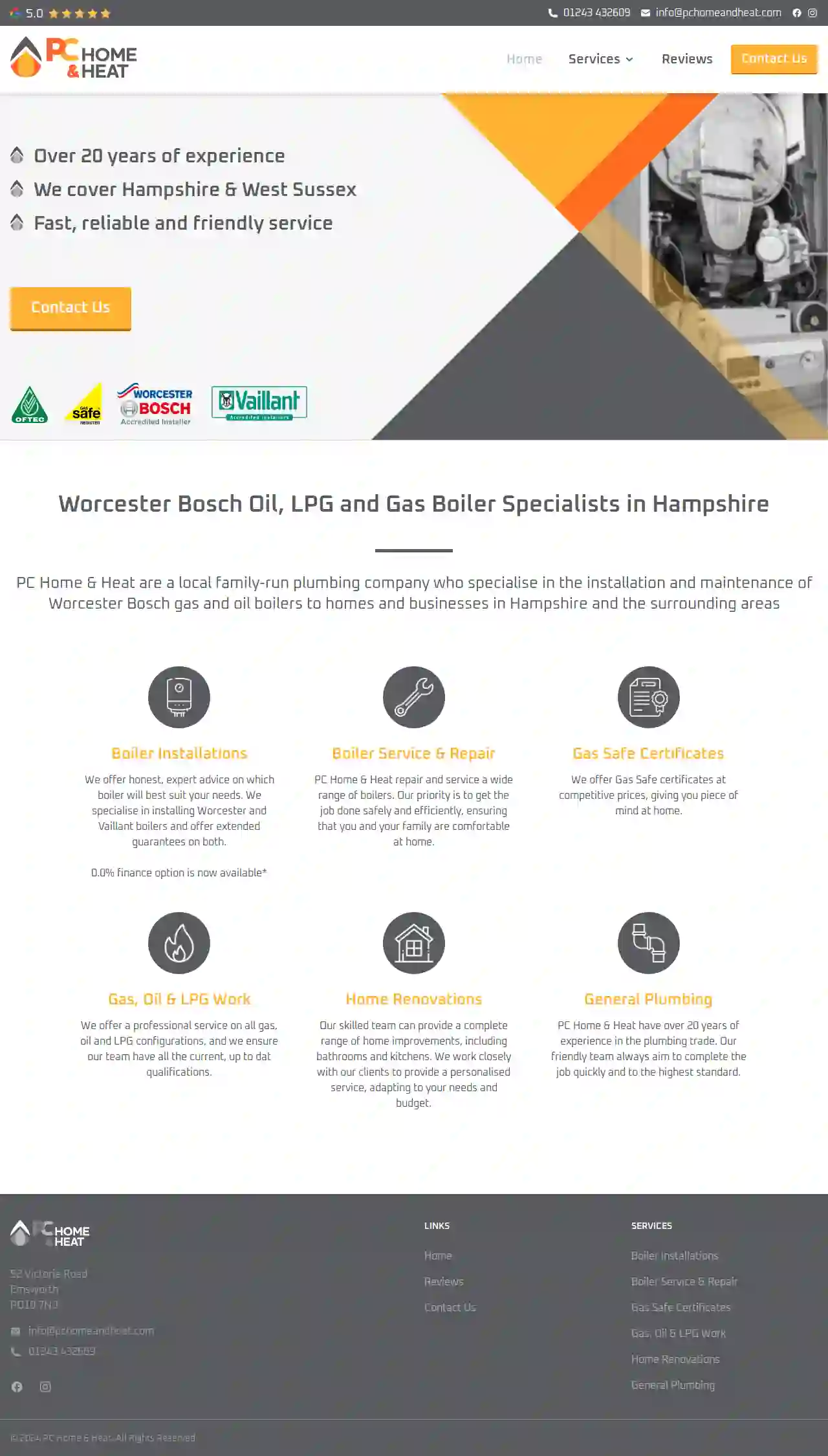
PC Home & Heat
55 reviews52 Victoria Road, Emsworth, PO10 7NJ, GBOver 20 years of experience, we cover Hampshire & West Sussex. Fast, reliable and friendly service. Contact Us. OFTEC Registered. Gas Safe Registered. We are a local family-run plumbing company who specialise in the installation and maintenance of Worcester Bosch gas and oil boilers to homes and businesses in Hampshire and the surrounding areas. We offer honest, expert advice on which boiler will best suit your needs. We specialise in installing Worcester and Vaillant boilers and offer extended guarantees on both. 0.0% finance option is now available. We repair and service a wide range of boilers. Our priority is to get the job done safely and efficiently, ensuring that you and your family are comfortable at home. We offer Gas Safe certificates at competitive prices, giving you piece of mind at home. We offer a professional service on all gas, oil and LPG configurations, and we ensure our team have all the current, up to date qualifications. Our skilled team can provide a complete range of home improvements, including bathrooms and kitchens. We work closely with our clients to provide a personalised service, adapting to your needs and budget. We have over 20 years of experience in the plumbing trade. Our friendly team always aim to complete the job quickly and to the highest standard.
- Services
- Why Us?
- Accreditations
- Our Team
- Testimonials
- Gallery
Get Quote
HeatOn Gas & Heating Services Ltd
53 reviews20 Winchcombe Rd, Basingstoke, RG21 8XH, GBWelcome to HeatOn Gas and Heating Services, your trusted partner for all gas and heating needs in Basingstoke and surrounding areas. Our team of certified technicians is dedicated to delivering high-quality installations, repairs, and maintenance to ensure your home's warmth and efficiency. Contact us today to learn more about how we can help keep your heating system running smoothly. At HeatOn Gas and Heating Services, we are committed to providing top-notch heating services to meet all your needs. Our comprehensive range of services ensures that whether you need a new boiler installation, routine maintenance, or emergency repairs, our expert team is here to help. We take pride in our work, offering reliable and efficient solutions tailored to your specific requirements. Why Choose HeatOn Gas and Heating Services? Customer-Centric Approach: We prioritise your needs and work diligently to exceed your expectations. Expert Technicians: Our team is highly skilled and experienced in all aspects of gas and heating services. Comprehensive Services: From installation to maintenance, we offer a full range of heating solutions. Quality Assurance: We use only the highest quality materials and latest techniques to ensure your satisfaction. Reach Out to us Don't wait any longer to experience top-quality heating services. Reach out to HeatOn Gas and Heating Services now and let our expert team ensure your home stays warm and efficient all year round.
- Services
- Why Us?
- Testimonials
- Gallery
Get Quote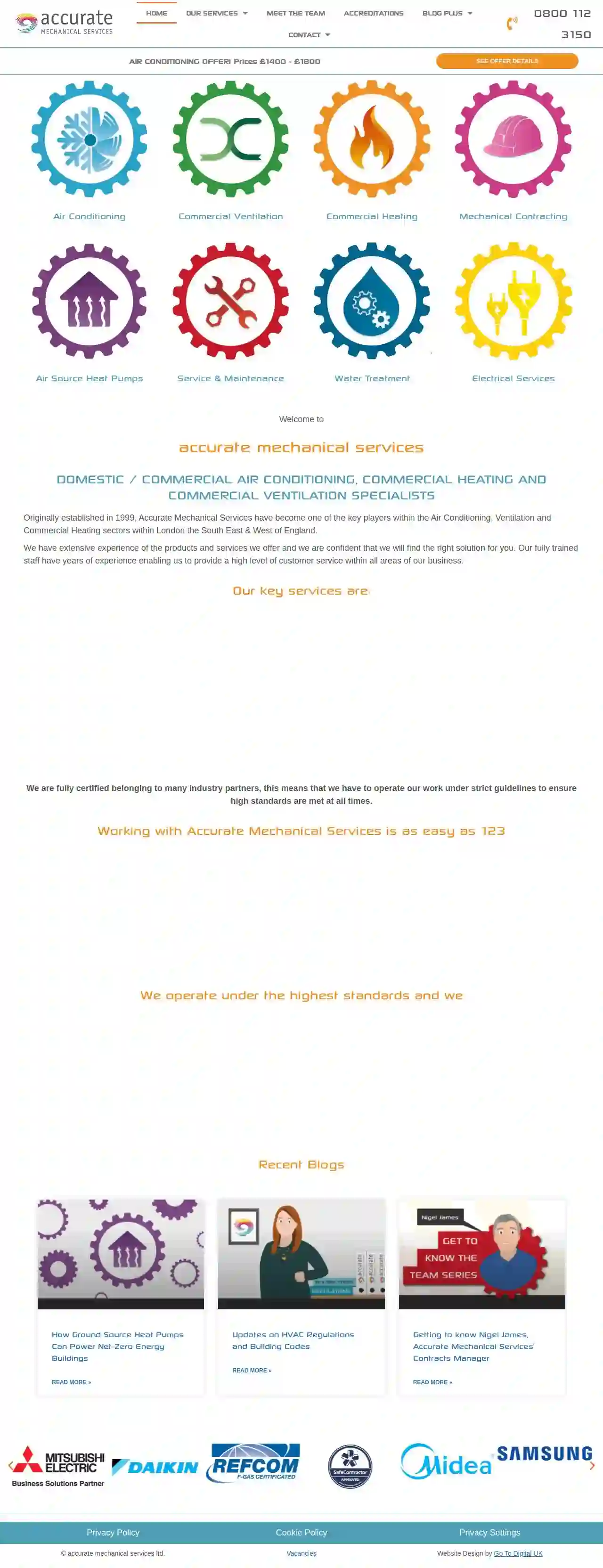
Accurate Mechanical Services
52 reviewsAldershot, GBWelcome to accurate mechanical services, Domestic / Commercial Air Conditioning, Commercial Heating and Commercial Ventilation specialists. Originally established in 1999, Accurate Mechanical Services have become one of the key players within the Air Conditioning, Ventilation and Commercial Heating sectors within London the South East & West of England. We have extensive experience of the products and services we offer and we are confident that we will find the right solution for you. Our fully trained staff have years of experience enabling us to provide a high level of customer service within all areas of our business. Our key services are: High end bespoke Mechanical Services, design and build. We offer specialist sub-contractor services to many Commercial Office fit out and industrial refurbishment companies. Air Conditioning, Ventilation and Commercial Heating installations. 24/7 Re-active breakdown service. Planned Preventative Maintenance (PPM) to ensure our customers equipment is in tip top condition. Carried out all year round to prevent possible equipment failures. We are fully certified belonging to many industry partners, this means that we have to operate our work under strict guidelines to ensure high standards are met at all times.
- Services
- Why Us?
- Accreditations
- Gallery
Get Quote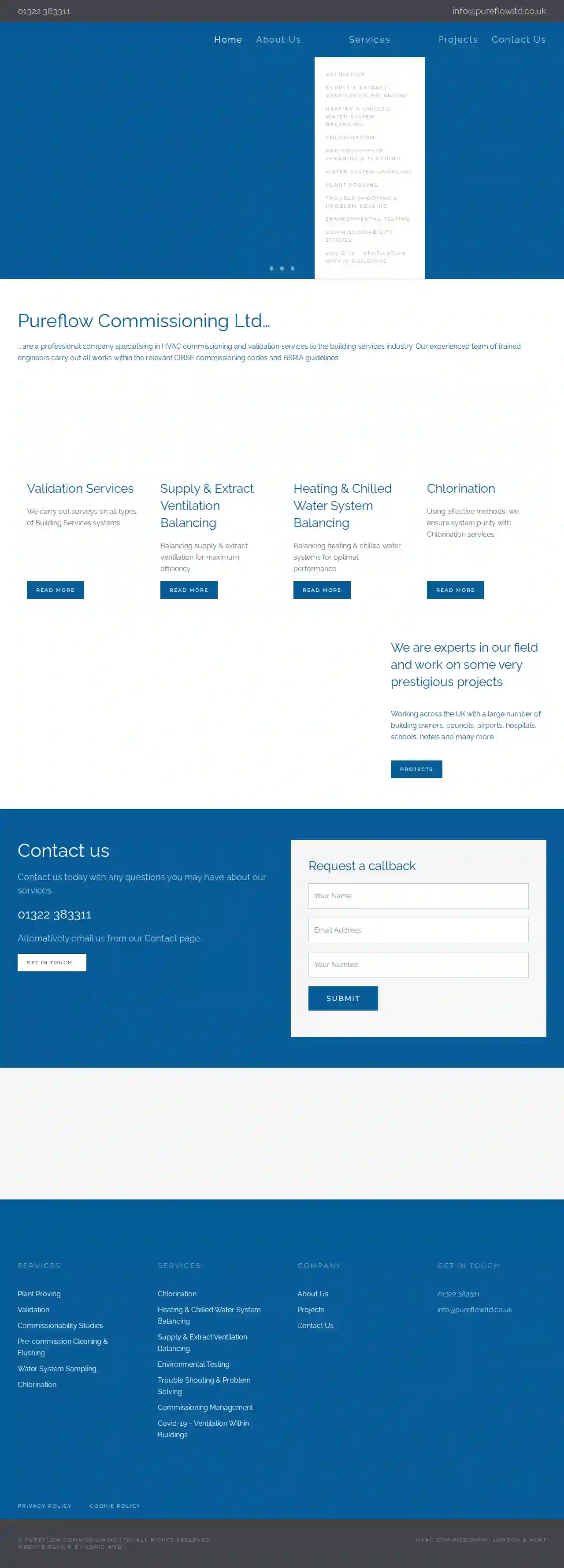
Pureflow Commissioning Ltd
17 London Road, Swanscombe, Unit 7, Swanscombe Business Centre, DA10 0LH, GBPureflow Commissioning Ltd. is a specialist HVAC commissioning and validation company serving the building services industry. We offer a comprehensive range of services, including plant proving, commissioning management, and environmental testing. Our team of experienced engineers is dedicated to ensuring that your HVAC systems are installed, commissioned, and validated to the highest standards.
- Services
- Why Us?
- Accreditations
- Gallery
Get Quote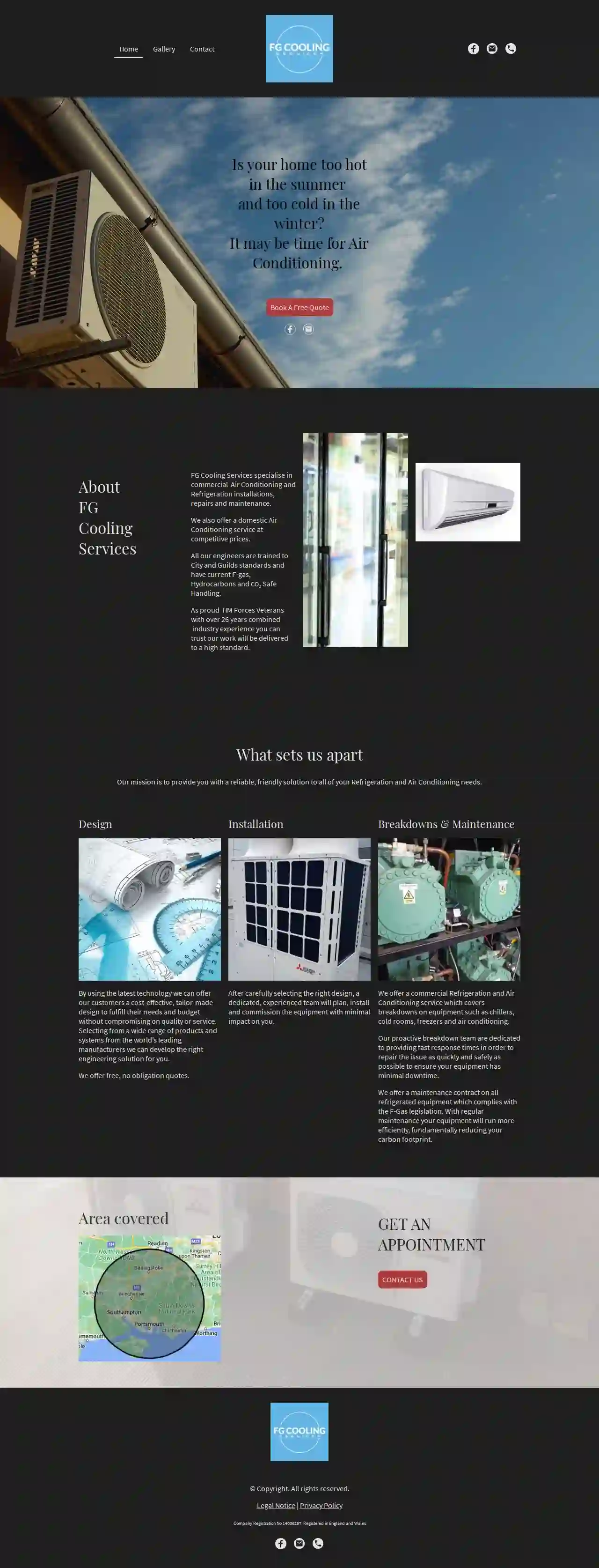
FG Cooling Services Ltd
51 reviews49 Bury Crescent, Gosport, PO123TZ, GBIs your home too hot in the summer and too cold in the winter? It may be time for Air Conditioning. Book A Free Quote FG Cooling Services specialise in commercial Air Conditioning and Refrigeration installations, repairs and maintenance. We also offer a domestic Air Conditioning service at competitive prices. All our engineers are trained to City and Guilds standards and have current F-gas, Hydrocarbons and CO₂ Safe Handling. As proud HM Forces Veterans with over 26 years combined industry experience you can trust our work will be delivered to a high standard. What sets us apart Our mission is to provide you with a reliable, friendly solution to all of your Refrigeration and Air Conditioning needs. Design By using the latest technology we can offer our customers a cost-effective, tailor-made design to fulfill their needs and budget without compromising on quality or service. Selecting from a wide range of products and systems from the world’s leading manufacturers we can develop the right engineering solution for you. We offer free, no obligation quotes. Installation After carefully selecting the right design, a dedicated, experienced team will plan, install and commission the equipment with minimal impact on you. Breakdowns & Maintenance We offer a commercial Refrigeration and Air Conditioning service which covers breakdowns on equipment such as chillers, cold rooms, freezers and air conditioning. Our proactive breakdown team are dedicated to providing fast response times in order to repair the issue as quickly and safely as possible to ensure your equipment has minimal downtime. We offer a maintenance contract on all refrigerated equipment which complies with the F-Gas legislation. With regular maintenance your equipment will run more efficiently, fundamentally reducing your carbon footprint. Area covered GET AN APPOINTMENT CONTACT US
- Services
- Why Us?
- Gallery
Get Quote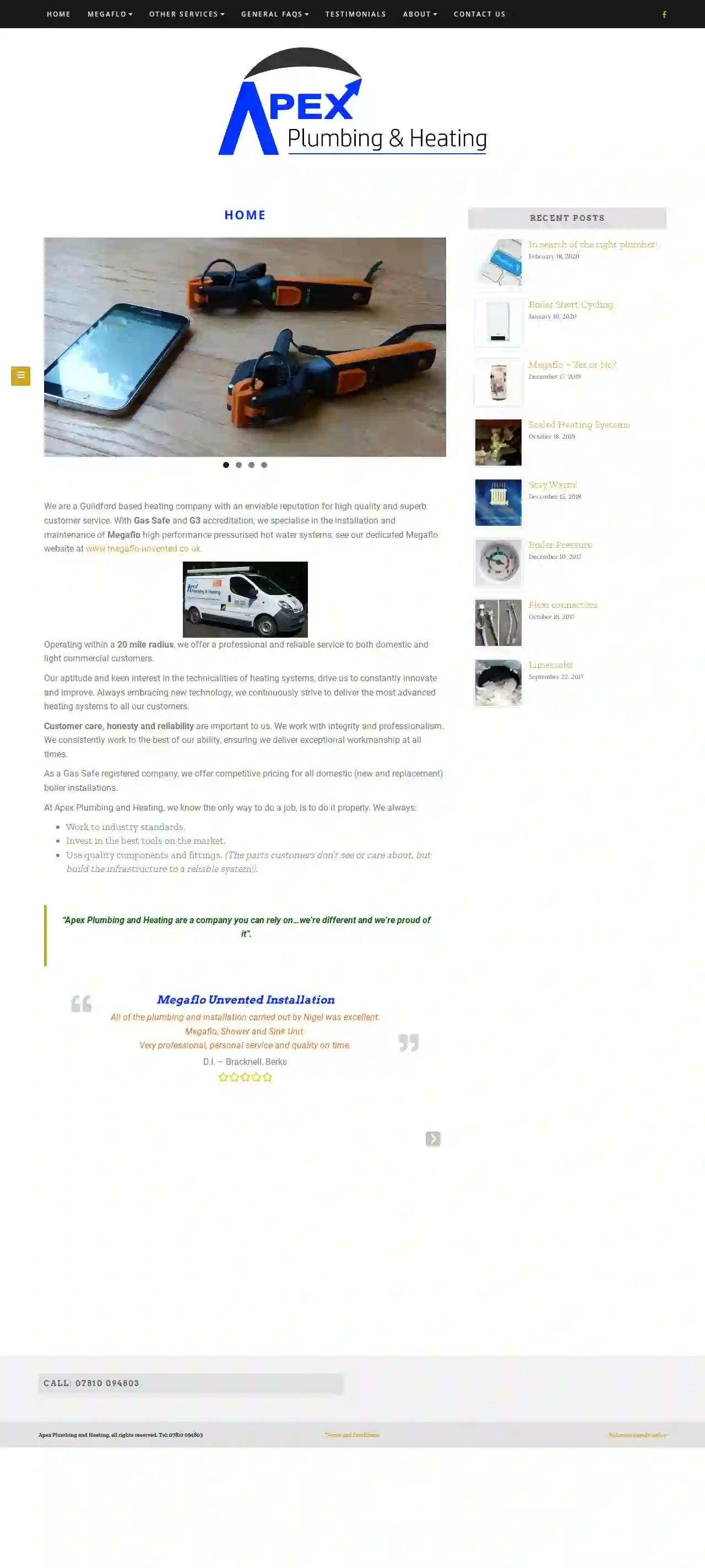
Apex Plumbing & Heating
559 reviewsGuildford, 123 High Street, GU1 1XX, GBWe are a Guildford based heating company with an enviable reputation for high quality and superb customer service. With Gas Safe and G3 accreditation, we specialise in the installation and maintenance of Megaflo high performance pressurised hot water systems; see our dedicated Megaflo website at www.megaflo-unvented.co.uk. Operating within a 20 mile radius, we offer a professional and reliable service to both domestic and light commercial customers. Our aptitude and keen interest in the technicalities of heating systems, drive us to constantly innovate and improve. Always embracing new technology, we continuously strive to deliver the most advanced heating systems to all our customers. Customer care, honesty and reliability are important to us. We work with integrity and professionalism. We consistently work to the best of our ability, ensuring we deliver exceptional workmanship at all times.
- Services
- Why Us?
- Accreditations
- Our Team
- Testimonials
- Gallery
Get Quote
Over 12,692+ HVAC Businesses on our directory
Our HVAC experts operate in Headley & surroundings!
HVACCompaniesHub has curated and vetted the Best HVAC Businesses in and around Headley. Find a top & reliable pro today.
Frequently Asked Questions About Boiler Installation
- Your boiler is more than 15 years old: Consider replacing an older unit with a new, high-efficiency boiler.
- Your boiler keeps breaking down: If your boiler requires frequent repairs, it might be more cost-effective to replace it in the long run.
- Your energy bills are increasing: An inefficient boiler uses more energy resulting in costly increases to your heating bills. Consider replacing it with an energy-efficient model.
- Your boiler is making strange noises: Unusual banging, whistling, or gurgling sounds might mean there is a serious issue with your boiler and should be investigated by a qualified heating engineer.
- Your radiators are not heating up properly: Radiators taking a long time to warm up, or some radiators not heating at all could indicate a boiler malfunction, air in the system, or circulation problems.
- Low water pressure: Low water pressure can be a symptom of issues with the boiler. A qualified technician should investigate the problem. .
- Leaks or drips near your boiler: If you notice leaks or drips around your boiler, turn off your boiler and immediately contact a qualified heating engineer to assess and fix the issue.
- Pilot light goes out frequently: A faulty pilot light is often a sign of bigger issues to come.
- Yellow flame instead of blue: A yellow flame could indicate the presence of carbon monoxide, which is a dangerous gas. . Seek immediate assistance from a qualified professional.
Can I install a boiler myself?
How long does it take to install a boiler?
What are the signs that I need a new boiler?
What is a combi boiler?
Can I install a boiler myself?
How long does it take to install a boiler?
What are the signs that I need a new boiler?
- Your boiler is more than 15 years old: Consider replacing an older unit with a new, high-efficiency boiler.
- Your boiler keeps breaking down: Frequent service calls might mean it's time for a new boiler.
- Your energy bills are increasing: An inefficient boiler uses more energy to heat your home, increasing your utility costs.
- Your boiler is making strange noises: Unusual banging, whistling, or gurgling sounds could indicate a problem with your boiler and should be investigated by a qualified heating engineer.
- Your radiators are not heating up properly: Radiators taking a long time to warm up, or some radiators not heating at all could indicate a problem with your boiler's circulation.
- Low water pressure: Low water pressure might mean your boiler is not functioning optimally. Have a heating engineer inspect the system.
- Leaks or drips near your boiler: If you notice water pooling around your boiler, it's important to get it checked by a professional immediately.
- Pilot light goes out frequently: If you have an older boiler and the pilot light goes out frequently, it may need to be repaired or replaced. .
- Yellow flame instead of blue: A yellow flame could indicate the presence of carbon monoxide, which is a dangerous gas. . If you see a yellow flame, turn off the boiler and contact a qualified technician immediately..